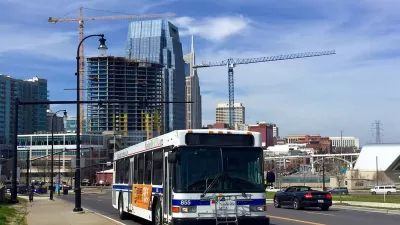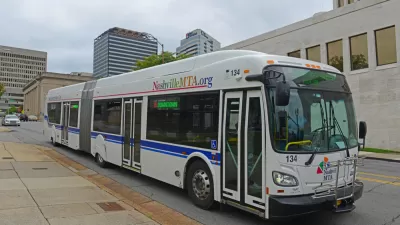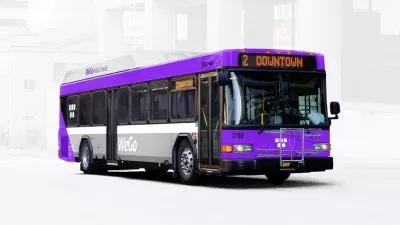Transit advocates suffered a resounding defeat in Nashville yesterday. The Let's Move Nashville plan does not have the funding to build-out its ambitiously pro-transit agenda.

"Nashville voters on Tuesday rejected a plan to raise four taxes to pay for a $5.4 billion transit plan," reports Joey Garrison.
The election was never close, even after the referendum won support from the Tennessean's editorial board a few weeks before the election.
We expect more commentary about the failure of the transit referendum to emerge in the coming days and weeks, but for now, there are reports of the opposition funding that flowed to the campaign in recent months. Angie Schmitt sounded alarms about the Koch Brothers and "dark money" influencing the campaign in April.
Writing for the Tennessean in a separate article, Alex Hubbard pins some of the blame for the loss on the resignation of Mayor Megan Barry, who was an early and active supporter of the Let's Move Nashville Plan.
Finally, the critics have certainly had their say. In the source article, Garrison summarizes the opposition, with a reference to self-driving cars.
Critics have called light rail antiquated and have contended it wouldn't do anything to cut down on traffic congestion. They've pointed to Nashville's dwindling bus ridership, the decline of ridership of legacy transit in other cities, and advancement in technology of self-driving cars, which they say will make transit obsolete.
FULL STORY: Opponents hold big lead in Nashville transit plan vote; pro-transit campaign concedes defeat

Study: Maui’s Plan to Convert Vacation Rentals to Long-Term Housing Could Cause Nearly $1 Billion Economic Loss
The plan would reduce visitor accommodation by 25,% resulting in 1,900 jobs lost.

North Texas Transit Leaders Tout Benefits of TOD for Growing Region
At a summit focused on transit-oriented development, policymakers discussed how North Texas’ expanded light rail system can serve as a tool for economic growth.

Why Should We Subsidize Public Transportation?
Many public transit agencies face financial stress due to rising costs, declining fare revenue, and declining subsidies. Transit advocates must provide a strong business case for increasing public transit funding.

How to Make US Trains Faster
Changes to boarding platforms and a switch to electric trains could improve U.S. passenger rail service without the added cost of high-speed rail.

Columbia’s Revitalized ‘Loop’ Is a Hub for Local Entrepreneurs
A focus on small businesses is helping a commercial corridor in Columbia, Missouri thrive.

Invasive Insect Threatens Minnesota’s Ash Forests
The Emerald Ash Borer is a rapidly spreading invasive pest threatening Minnesota’s ash trees, and homeowners are encouraged to plant diverse replacement species, avoid moving ash firewood, and monitor for signs of infestation.
Urban Design for Planners 1: Software Tools
This six-course series explores essential urban design concepts using open source software and equips planners with the tools they need to participate fully in the urban design process.
Planning for Universal Design
Learn the tools for implementing Universal Design in planning regulations.
City of Santa Clarita
Ascent Environmental
Institute for Housing and Urban Development Studies (IHS)
City of Grandview
Harvard GSD Executive Education
Toledo-Lucas County Plan Commissions
Salt Lake City
NYU Wagner Graduate School of Public Service





























